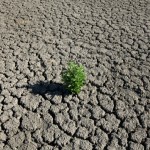Drought Claims 2,000 Jobs in Panhandle

Photo Courtesy of the USDA. http://www.flickr.com/photos/usdagov/7732742494/in/photostream/
USDA workers inspect an unnamed beef processing plant in Plainview, Texas in 1991.
A beef processing plant in Plainview, Texas will close its doors today, citing a dwindling cattle supply in the region. Wichita, Kansas-based Cargill Beef said in a press release that about 2,000 jobs will be lost. The supply issue was brought on primarily by “years of drought in Texas and the Southern Plains states,” the company says.
“The U.S. cattle herd is at its lowest level since 1952,” Cargill president John Keating said in the statement. “Increased feed costs resulting from the prolonged drought, combined with herd liquidations by cattle ranchers, are severely and adversely contributing to the challenging business conditions we face as an industry.”
A rainier-than-expected winter and spring last year prompted some to think the Texas cattle industry might rebound, but the closure underlines the long-term effects that the years long dry spell has had on Texas agriculture.
“You can’t just bring cattle back the day it rains. You have to let grasses regrow and your forage base reestablish before you can bring cattle in,” Travis Miller, a scientist with Texas A&M’s Agrilife Extension Service, told KUT radio.
Even when ranchers decide to reinvest in cattle, it doesn’t mean more cattle will head to the slaughterhouse. In fact, it can mean exactly the opposite.
“When it does rain, we ranchers will start retaining heifers to build these cow numbers back. There’s going to be a time there when there’s actually going to be less beef on the market,” Pete Bonds, former head of the Texas Cattle Raisers Association, told StateImpact Texas in a 2011 interview.
Though the chance for heavy rains in Texas is appearing less and less likely, and the return of more extreme drought is becoming an increasingly realistic prospect.
A Community Hit Hard
Cargill is the largest employer in the Panhandle community of 22,500 and news of the closure is described as “shocking” in the Lubbock Avalanche Journal, though local officials appear to be keeping a stiff upper lip in the wake of the closure.
“Positive times are in the future,” Plainview Mayor Wendell Dunlap told the paper. Though some comments under the article are not so optimistic.“This is going to hit Plainview hard,” writes one commenter. “There’s nothing there that will absorb the job loss of 10% of its population,” writes another.
State Agricultural Commissioner Todd Staples, who is also running for Lieutenant Governor, called the closure a “devastating blow to this Texas Panhandle community and the economic health of Texas.” Staples responded to the closure by promising to work to restore the jobs. Cargill says it has no plans to sell the plant and that the plant will remain “idle” for potential reopening.
However, the company’s statement on the closure makes it clear that “Cargill does not expect the U.S. cattle herd to significantly increase in size for a number of years.”

